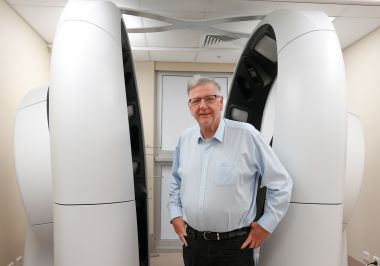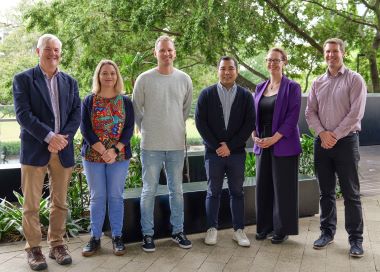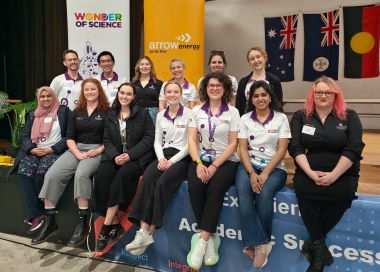Teams of researchers from The University of Queensland working on pioneering melanoma imaging and preventing deadly infections, along with a science engagement team, have won prestigious 2024 Australian Museum Eureka Prizes.
The Eureka Prizes, honouring excellence in scientific discovery, invention, communication and innovation, were announced in Sydney on 4 September.
Detecting deadly cancers
Professor H Peter Soyer and the team at the ACRF Australian Centre of Excellence in Melanoma Imaging & Diagnosis won the Aspire Scholarship Eureka Prize for Excellence in Interdisciplinary Scientific Research for work on the early detection of melanoma.
Professor Soyer said the multidisciplinary team was conducting the largest ever Australian melanoma cohort trial of 15,000 individuals undergoing 3D total body imaging.
"Our research is investigating the effectiveness of 3D total body photography to assist clinicians, streamline skin cancer imaging and enhance diagnosis," Professor Soyer said.

"This research will inform work towards a national, targeted melanoma screening program.
"We have deployed 3D imaging systems across regional Australia to bolster telehealth capabilities and ensure equitable access to melanoma early diagnosis.
"With more than 18,000 cases of melanoma diagnosed in Australia every year, the centre leads world efforts to improve screening and management of this deadly cancer.
"I'm thrilled that this hardworking team has been recognised with this prestigious award."
The team from the ACRF Australian Centre of Excellence in Melanoma Imaging & Diagnosis is a collaboration between The University of Queensland, University of Sydney and Monash University.
Preventing Strep A
Professor Mark Walker and his team from UQ's Institute for Molecular Bioscience together with colleagues from the University of Melbourne, CONACYT and University of Wollongong won the Australian Infectious Diseases Research Centre Eureka Prize for Infectious Diseases Research for their work on preventing Streptococcus A outbreaks.
Responding to a post COVID-19 surge in Streptococcus A infections, Professor Walker and his team formed the StrepA Outbreak Prevention Team.

"Strep A bacteria are responsible for common throat infections and are the major cause of childhood diseases such as scarlet fever and septicaemia which contribute to child deaths globally," Professor Walker said.
"The team is tracking the disease and leading efforts to develop a much-needed vaccine.
"Indigenous Australians have the highest rates of Strep A in the world, so it is imperative that we understand the mechanisms of the spread of the disease.
"This prize is further motivation for our team to keep working towards a vaccine to prevent outbreaks of this potentially deadly infection."
The Wonder of Science
Wonder of Science, led by palaeontologist Dr Kaylene Cooper, has won the Department of Industry, Science and Resources Eureka Prize for STEM Inclusion for delivering STEM education programs to thousands of schools across Queensland since 2012.
"In the 12 years we've been operating, we've reached almost 124,000 people, providing teacher support and STEM challenge tasks for Year 4-9 students," Dr Cooper said.

"Our mission is to create a culture where all students, their teachers, parents and other community members understand and value the importance and potential of science, and STEM pathways and careers.
"In particular, we are supporting low-income, female, neurodiverse and Indigenous students to build scientific literacy.
"We are so excited that the team, which has been bringing STEM to life for young Queensland students for more than a decade, has been acknowledged with such a premier award."
Images: From top left - Professor H Peter Soyer; Professor Mark Walker (at far left) and the StrepA Outbreak Prevention Team; Dr Kaylene Cooper (at far right) and the Wonder of Science team.
Media contact
UQ Communications






